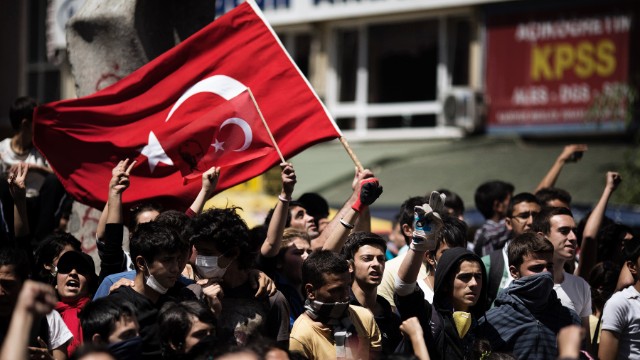and
Recent revelations that the US Government is involved in (a long suspected but previously unverifiable) elaborate data surveillance program.
Both of these are fascinating stories and deserve discussion but for now, I'm going to avoid delving into the NSA surveillance programs for two reasons:
1. It is an absolutely massive story-- a veritable Metroyshka Doll of clandestine surveillance programs that are opening, layer by layer, before our very eyes-- and there are plenty of great journalists doing the leg work to expose it in detail.
2. As of this post, I can't find a link between these surveillance programs and political financing-- which isn't to say that one doesn't exist, but until I can point one out, the story eludes the purpose of this site.
On the other hand, there is an interesting discussion to be had on the US Foreign Policy approach to the current state of unrest in Turkey. In his most recent post at the Nation, Lee Fang points out a possible reason for the relative silence of US politicians on Turkish unrest and the subsequent violent crackdown by police and government officials: A powerful Turkish lobbying faction.

As it turns out, since 2007 Turkey has hired at least six lobbying firms to curry favor with US elected officials. One of these lobbying groups, Brown Lloyd James, has a long list of "esteemed" clients including: Muammar Gaddafi, Bashar al Assad, and the State Department-listed terrorist organization Mujahideen-e-Khalq or MEK. Yet another firm they've contracted with is headed by former Democrat House Minority Leader, Dick Gephardt-- another fine example of US revolving door politics.

So yes, Turkey is a major player in the US political lobbying game. In fact, according to a Propublica report from 2009, Turkey had more congressional contacts than any other foreign nation and was the fifth largest foreign nation spender. A large effort, for instance, has been made to avoid the passage of US House Resolution 106, which seeks to officially recognized the Armenian genocide perpetrated by Turkey nearly a century ago; a legislative action that Dick Gephardt was for before he was paid to be against it. To date the lobbying efforts have been largely successful in this endeavor.
If the powers that be in Turkey will fight tooth and nail to kill a US House bill that acknowledges a century old shame, is it that far of a stretch to assume that they will extend the same effort to silence any acknowledgement by US politicians of the brutality of the protest crackdown?
***
Note: This is an undoubtedly complicated issue and this isn't an attempt at a one size fits all explanation, but there is a very real lobbying effort in Washington on behalf of the Turkish government and its influence should be acknowledged and considered.

No comments:
Post a Comment